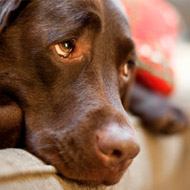What drives people to abuse animals?

"By our very nature we are a very caring profession and it is quite a challenge for us to get our heads around why one, somebody would want to deliberately hurt an animal" - Paula Boyden.
Opening the welfare and ethics stream at BSAVA Congress this morning, Paula Boyden - Dogs Trust veterinary director and treasurer of The Links Group - spoke about what drives people to abuse animals and offered pointers for recognising signs of animal cruelty in patients.
She explained that there are a whole range of terms that may be used to describe abuse, but the fundamental rule to remember is that we need to be really clear about the terminology and what we mean when we use those terms.
She explained that in the case of companion animals, the well-researched terminology associated with child abuse can be used to avoid any confusion within professions.
Paula noted that the recognised categories of abuse are physical, sexual, emotional and neglect. These terms are also known as non-accidental injuries (NAI) or 'battered child syndrome' and can be difficult - both emotionally and intellectually - to deal with.
Commenting on the typical veterinary personality, she said: "By our very nature we are a very caring profession and it is quite a challenge for us to get our heads around why one, somebody would want to deliberately hurt an animal and two, why would they then bring it to us to get it fixed. It just does not sit right at all."
Paula spoke of the similarities in the abuse of humans and the abuse of animals and explained that this is due to one common denominator: the human perpetrator. She said that perpetrators of abuse will use the strength of the human/animal bond to have power and control over their victims. For example: 'if you don't do as I say, I will hurt the family pet.'
Paula concluded her lecture by looking at what vets are allowed and what vets are not allowed to do when it comes to reporting abuse. She referred to the recently published guidelines for vets and nurses on recognising the symptoms of domestic abuse, which were launched by the Animal Welfare Foundation and The Links Group last year.
The guidance document provides a reminder of the veterinary profession's responsibilities under the Animal Welfare Act and defines the types of abuse and how to recognise them.
It also gives an overview of the links between child, animal and domestic abuse, explains the importance of a multi-agency approach, and offers practical advice on how to establish channels of communication with human agencies.
For more information about the Links Group visit www.thelinksgroup.org.uk.



 The Veterinary Medicines Directorate (VMD) is inviting applications from veterinary students to attend a one-week extramural studies (EMS) placement in July 2026.
The Veterinary Medicines Directorate (VMD) is inviting applications from veterinary students to attend a one-week extramural studies (EMS) placement in July 2026.